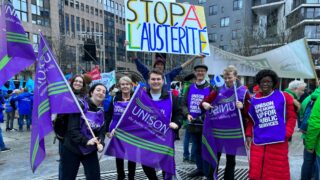The service people would most like councils to spend money on is rubbish collection and recycling, according to a UNISON/ComRes poll published today (Thursday).
Nearly two in five (39%) say it would be their number one choice if the government were to give their local authority extra cash, followed by pavements (32%) and homecare (30%). Parks (28%) and public toilets (26%) also made it into the top five.
Women are more likely than men to want councils to spend extra money on homecare (34% compared to 27%), and youth centres (25% compared to 20%).
Older adults aged 55 and above are more likely than 18 to 34-year-olds to want additional cash spent on pavements (40% v 21%), homecare (43% v 19%) and public toilets (33% v 18%).
In contrast, younger people are more likely than the over55s to want any additional funding to go on parks (29% v 19%) and leisure facilities (26% v 17%).
Only a quarter (25%) of 18 to 34-year-olds know their local authority can help if they buy an unsafe item compared with more than half (51%) of respondents aged 55 and above. Just under two in five (38%) people overall know to contact trading standards.
The research has been published to coincide with UNISON’s first Local Service Champions Day, an event to raise awareness oftheimportant contribution local government workers make to their communities.
The findings highlight how public awareness levels of council services is mixed. More than two thirds of adults are aware council staff deal with noise complaints (71%) and refuse collection (69%).
But fewer than two in five know they deal with lost or stray dogs (37%), while just over half are aware they deal with abandoned cars in the street (53%).
A similar picture emerges regarding the use of facilities provided by the local authority. The vast majority have visited parks (88%), libraries (86%), local museums or theatres (83%), public toilets (82%) and leisure centres (82%).
In comparison, less than a third (31%) have sought advice on housing, or used youth centres (28%) or homecare (18%).
Nearly a quarter (23%) of adults who have used at least one service in the last 24 months believe the quality has decreased. Just one in ten (9%) believe it has improved.
UNISON head of local government Jon Richards said: “From refuse collection to providing support for loved ones, public service workers keep communities running.
“They go above and beyond to deliver for the public. This is despite cutbacks meaning they’re working in challenging circumstances with fewer colleagues than before.
“These awards are a chance to highlight just how much council employees improve people’s lives. They’re a ‘thank you’ to the unsung heroes of our local communities.”
Notes to editors:
– The poll was carried out by ComRes who surveyed 2,006 British adults between October 4 and 6 2019. Data were weighted to be demographically representative of all British adults. ComRes is a member of the British Polling Council and abides by its rules. Full tables at www.comresglobal.com
– To mark Local Service Champions Day, UNISON branches UK-wide will hold events on 17 October to raise awareness of local government staff, what they do and their impact on communities. Some local councillors will also be supporting the campaign by attending events and sharing the campaign on social media.
– UNISON will today (Thursday) also launch a national Local Service Champions Award, to honour three outstanding local government workers for going above and beyondto improve people’s lives, despite the considerable adversity they face.
– Nominations open onlineon 17 October and close on 15 November, with one winner and two runners-up chosen/announced by 30 January 2020. Anyonecan submit nominations including colleagues, people using services or the public.
– Some of the workers featured in the Local Service Champions Day (pictures available):
Assistant contracts officer Karen Hodgson works for Eden District Council, in Penrith. She estimates that she travels 680 miles each month, checking that grass is being cut, refuse and recycling collected, streets and play areas are cleaned.Karen andher colleagues will pick up recycling in their own cars and take it to a centre if there’s a missed collection. She says: “These are frontline services and the ones people complain about more often, because they’re more visible. It’s nice to know that when complaints come in, we can go out and sort it.”
Chris Jobson is a refuse driver for Barnet Borough Council, in London. His day starts at 5.30am and he collects two 20-tonne loads of rubbish daily. For many years he did the same round: “You can get to know the father, the mother, the daughter, the son, thegrandchildren – you see them grow up. I’ve even been invited to weddings.”
– UNISON is the UK’s largest union, with more than 1.3 million members providing public services – in education, local government, the NHS, police service and energy. They are employed in both the public and private sectors.
Media contacts:
Garfield Myrie T: 0207 121 5437 M: 07432 741565 E: g.myrie@unison.co.uk
Liz Chinchen T: 0207 121 5463 M: 07778 158175 E: l.chinchen@unison.co.uk


